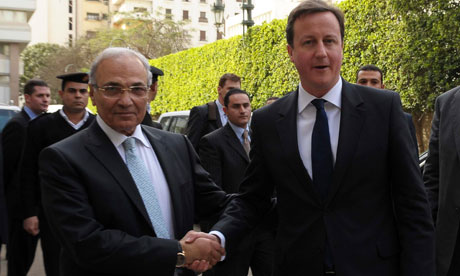David Cameron's Cairo visit overshadowed by defence tour
Long-scheduled trade mission with eight leading UK defence companies to Gulf states undermines democracy message

David Cameron's efforts to promote democracy in the Middle East by becoming the first foreign leader to visit Cairo were overshadowed as it emerged that he will spend the next three days touring undemocratic Gulf states with eight of Britain's leading defence manufacturers.
After a hastily convened stopover in Egypt, where he spoke of being "inspired" by protesters, the PM began a long-scheduled trade mission by landing in Kuwait, a key military ally. Britain has approved 1,155 arms export licences for Kuwait since 2003, worth a total of £102.3m, according the Campaign Against the Arms Trade.
Key deals on the table this week include the sale of Eurofighters to the Gulf.
Meanwhile Gerald Howarth, a British defence minister, was also attending the region's largest arms fair, in Abu Dhabi, where a further 93 British companies are promoting their wares. They included companies selling rubber bullets and CS gas for crowd control as well as heavily armoured riot vans.
The marketing drive aimed at military and police buyers was backed by a 15-strong delegation from UKTI, the trade promotion wing of the department for business which is co-hosting a British pavilion with ADS, the UK arms trade association.
Critics rounded on Cameron for continuing with his trip despite the crackdown on protesters across the region. Kevan Jones, the shadow defence minister, said: "The defence industry is crucially important to Britain but many people will be surprised that the prime minister in this week of all weeks may be considering bolstering arms sales to the Middle East."
Denis Macshane MP, a former foreign office minister, added: "It shows insensitivity and crassness of a high order for the prime minister to take arms salesmen with him on his Middle East trip."
Britain faced embarrassment over the weekend when it was forced to revoke arms export licences to Bahrain and Libya amid fears that British arms may have been used in the violent crackdown on protesters. Cameron, who is seeking assurances that no British arms were used against protesters, insisted that Britain has some of the toughest rules on arms exports in the world. But he admitted that the system had failed in Libya and Bahrain.
"In some cases those assessments you will get right and in other cases you have to revoke export licences as we have done very rapidly."
The prime minister will start his Gulf visit on Tuesday by attending ceremonies in Kuwait marking the 20th anniversary of the end of the first Gulf war.
Ian King, chief executive of BAE Systems, will be the most senior figure on the trade delegation that also includes Victor Chavez of Thales UK and Alastair Bisset of Qinetiq. The 36-strong business delegation, nearly a quarter of whom come from the defence and aerospace sectors, will attend some, but not all, of the prime minister's three-day visit to the Gulf.
Other defence and aerospace manufacturers accompanying Cameron include Rob Watson, regional director of Rolls Royce; Charles Hughes, vice president marketing of the Cobham Group; Douglas Caster, the chief executive of Ultra Electronics; Andy Pearson, managing director of Babcock International Group; and Richard Barrett, regional director of Atkins.
Amid fears in Downing Street that a traditional trade visit would have looked out of place, as protests sweep across the Arab world, the PM hastily added a six-hour stopover in Cairo, including a walkabout in Tahrir Square. Cameron met Field Marshal Mohammad Hussein Tantawi, head of the supreme council of the armed forces which assumed power on 11 February, and Ahmed Shafik, the prime minister.
Cameron told Tantawi to show he is presiding over a "credible transition" to civilian rule. "The state of emergency should be lifted, all other political prisoners should be released, they need to have opposition members in their government so that it is a credible transition," he said.
The prime minister spoke of being inspired when he met some of the protesters, though he did not meet members of the Muslim Brotherhood. "Meeting the young people and the representatives of the groups in Tahrir Square was genuinely inspiring. These are people who have risked a huge amount for what they believe in."
But the original purpose of the trip – to cement ties with long standing allies in the Gulf and to promote trade – will come to the fore when Cameron signs business deals with the Kuwaiti government. The prime minister, who declared soon after his arrival in Downing Street last year that promoting trade would be one of his main foreign policy priorities, was unapologetic about taking defence manufacturers to the Gulf. "I have got a range of business people on the aeroplane, people involved in infrastructure and people involved in the arts and cultural exchanges. Yes, we have defence manufacturers as well. Britain does have a range of defence relationships with countries in the region. I seem to remember that we spent a lot of effort and indeed life in helping to defend Kuwait. So it is quite right to have defence relationships with some of these countries."
The prime minister acknowledged that people have reservations about promoting the defence industry. "There is an argument to be had about whether it is right to be involved in the defence trade," he said. "My view is that you cannot expect every country in the world to provide for its own defence and so it is perfectly logical and sensible that there should be a trade in defence. Kuwait is a good example of a country that has been moving in an open and participatory direction."


 5:32 AM
5:32 AM
 Wikipedia
Wikipedia

 Posted in:
Posted in: 

0 comments:
Post a Comment